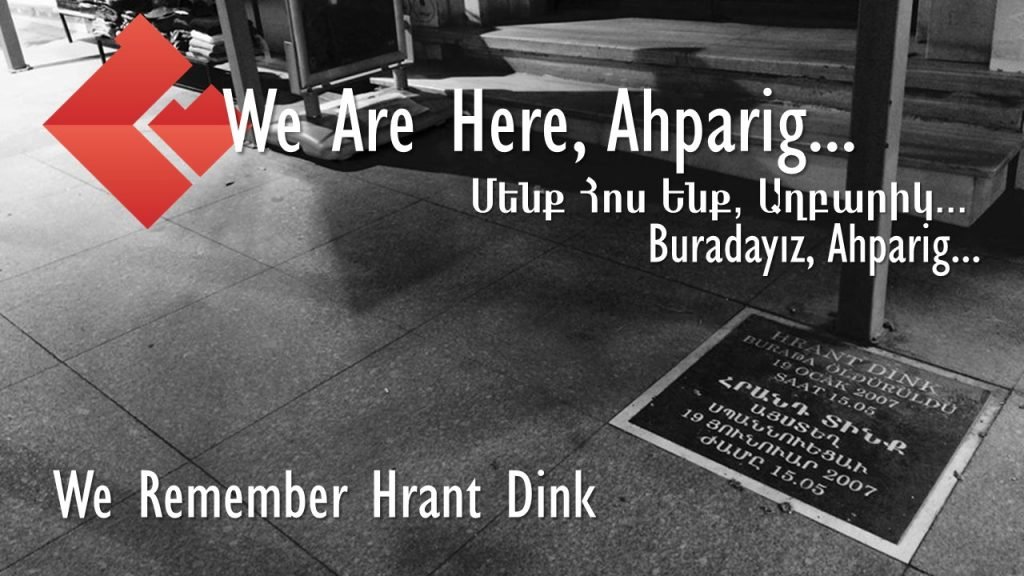I was a freshman in college when I got the news in class.
“Hrant Dink was shot dead today,” the e-mail simply read, accompanied by a BBC News report link.

I remember leaving class early that day and heading down to my department’s student center, where the news of the assassination was on the massive television screen high up on the wall.
The headline “TURKISH-ARMENIAN JOURNALIST SLAIN IN ISTANBUL” didn’t seem to interest the hordes of students there, who were eagerly waiting for the weekend to arrive on that cold Friday morning. The crowds didn’t budge about what had just happened because they likely did not know who Dink was. I had only learned about the man lying face down on the pavement in front of his office a few years earlier.
That night, I felt compelled to do something I had never done before. Writing had always been something that I enjoyed, but had never really done much of outside of school. But that day, for some reason, 18-year-old me needed to put pen to paper and write his reflections about what had transpired earlier that day.
“The Genocide Continues: An Expected Outcome,” is what I titled what I believe was my first ever published op-ed. Reading the article today—10 years later—is cringe-worthy, to say the least. It is full of run-on sentences, grammatical nightmares, and the romantic, impractical sentiments of an 18-year-old history student.
But however raw, the words carried a sense of truth and honesty—two things I have come to cherish more and more since that fateful January day.
Before being assassinated, Dink had endured countless threats by Turkish ultranationalists for his writing—particularly for his statements on Armenian identity and the Armenian Genocide.
“The year 2007 will probably be a more difficult year for me. Trials will continue, new cases will come up in court. Who knows which kind of injustice I will encounter,” Dink wrote in his last editorial, published the day he was assassinated. In the editorial, he went on about how Turkey was becoming increasingly dangerous and how he hoped he wouldn’t be forced to leave the country.
Turkey was, indeed, a difficult place for Dink and anyone else who expressed themselves freely in 2007. And today—a decade later—the truth is that this reality has not changed much.
Just less than a week ago, Armenian member of Turkish Parliament Garo Paylan was banned from three parliamentary sessions after referring to the Armenian Genocide.
Turkey remains a country where speaking truthfully about what happened to its minority populations more than a century ago is not only taboo, but strictly forbidden.
It remains a country that continues to abuse human rights at what seems like every chance it gets.
It continues to be led by a power-hungry dictator, who appears to want to end the idea of a democratic Turkey.
From its perpetual mistreatment of the Kurdish community, to the fact that it persists as the leading jailer of journalists, some may argue that Turkey is in a more dismal state than when Hrant left it—rather, was forced to leave it—forever.
Yet today, ten years after Dink’s murder we ask ourselves questions about the impact he made.
Would politicians and activists speak about the Armenian Genocide in Turkey if it was not for Dink’s courage?
Would Armenian communities around the world really care about what went on in Turkey if it was not for Dink’s message?
Would movements such as Nor Zartonk exist in a country that had effectively not seen Armenian activism in almost a century if it was not for Dink’s message of truth?
And quite selfishly, would I be writing this editorial—or any editorial, for that matter—if it was not for his death?
No one will know for sure. What I do know, however, is that I must thank you today, Hrant.
Thank you for your honesty.
Thank you for your courage.
Thank you for coming into our lives and effectively changing them forever.


Once a Turkish writer wrote in his article that Turkish story now has two parts, ” Before Hrant and after Hrant”. I think the same is right for us, too. No words needed.
we should all be involved in Turkey’s human rights violations, be aware of them and let the world know about; even though we as Armenians were thrown out of the Empire, there is a connection that can not be denied, we don’t have the citizenship to prove it, but we belong in those lands just like Hrant, Garo and every other Turkish citizen whose life is in danger, or who is in prison, due to his academic, scholar, journalist, human rigths activist job. @minassianok
Yes, we became acutely aware of Hrant’s message and we also became ware that journalists with integrity around the world are in danger of imprisonment, torture and death. Turkey does not hide its cruel means and the so called Western world sees, watches and does nothing. Yes, Hrant left a legacy for us, to continue our path and struggle to achieve human rights, no matter how difficult, impossible and unattainable seems our road.